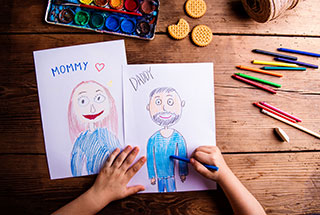
The Challenges of Handling a Divorce with Children
Getting a divorce when you have children is complicated. Children of any age can be negatively affected by divorce, so it’s important to work with your former spouse to create a good outcome for your kids. Finding a solution that works well for both parents and is good for the kids, however, can be easier said than done. There is no simple solution to navigating a divorce with children, however there are some practices to put into action to make the process a bit easier. Here are four tips to help navigate divorce with children.
1. Make a Strong Effort to Preserve the Relationship with the Other Parent
Preserving a relationship between you and your former spouse may be the last thing you want to do. In most cases, however, it is important to maintain some form of relationship with that person, because even if they are no longer your spouse, that person is still your child’s other parent.
Even when you are no longer husband and wife, you are still Mom and Dad (or Mom and Mom, or Dad and Dad, or maybe even some other labels). You may not think the other person is a great parent, but preserving some form of relationship is integral for children. Some easy ways to do this include making sure children have sufficient time with each parent and making sure your kids know both parents love and care for them.
2. When Going Through a Divorce with Children, Protect Them from Conflict as Much as Possible
Protecting kids from conflicts between you and your spouse is an important aspect in maintaining a relationship with the other parent.
Making an effort to keep your children away from the gory details of the divorce can help in this process. Do your best to avoid speaking ill of the other spouse, and avoiding arguing with them in front of your children. This is a confusing time for your child, and doing your best to keep arguing and disagreement away from the children can make the process easier on them. Also, make sure you do not leave any of the legal papers lying around where the children could find and read them.
Another way to protect your children from the conflict of divorce is to insure they are not being put in the middle of the divorce. Asking a child to choose one parent over the other is an awful position to be in, so this may mean avoiding asking them with which parent they would prefer to live with and how much time they’d like to spend with each parent.
3. Find Ways to Co-Parent While Living Apart
When parents live separately, each parent often has their own way of parenting and their own rules within their house. Creating rules children adhere to in both places can give them a sense of stability and co-parenting, even while their parents live in different places.
Some ways to implement co-parenting practices while living separately include:
-
Not criticizing the other parent if they handle a situation differently than you would have.
-
Supporting the other parent’s decisions.
-
Both parents should be able to tell the children that both styles and rules are valid, and support their former partner in their parenting style.
From time to time, it is also important to connect with your co-parent and talk about significant parenting decisions. When the two of you have come to a decision together, this can create a united front as parents for children, even if you are no longer spouses. This sort of unification will help both parents and kids. Without a united front, children will learn to play both of you off against the other, making parenting harder for both parents. If instead, parents can tell children, “We have decided.” This can set better boundaries and guidelines for them.
4. Collaborate with a Child Specialist
A child specialist is a professional who is trained to navigate a child’s needs during a divorce. Making an effort to meet with a child specialist with your former spouse can be highly beneficial. Even if your spouse won’t join these meetings, it can be beneficial to attend on your own.
A child specialist should have a background in child development and psychology. This means they have specialized experience in what dealing with divorce is like for children, and alert you to any red flags they see. Children can do a great job of hiding stress, so including a professional in your divorce proceedings can be highly beneficial.
Involving an expert can also help shape a co-parenting plan moving forward. Because this person is a professional in these types of proceedings, they can suggest provisions to strengthen the parenting plan, and help both parents talk through any disagreements about how best to parent.
Divorce can be difficult for all parties involved, but taking some steps to make it easier on your children will be well worth it in the end!











Add A Comment